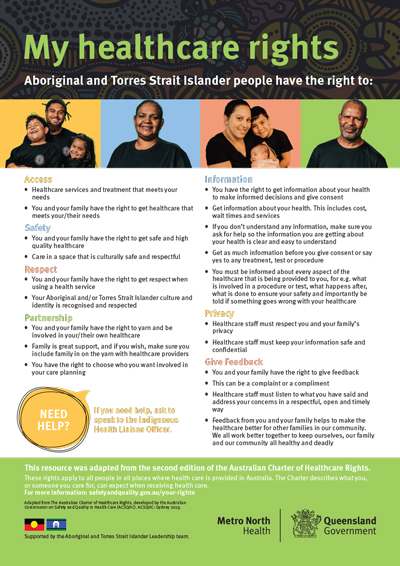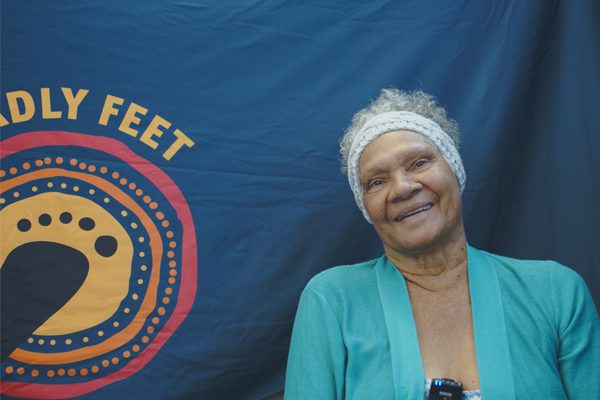Health Information
The National Bowel Cancer Screening Program is a Commonwealth Government initiative that posts a free test kit to eligible men and women aged 50-74 years to test for early signs of bowel cancer. By 2020, all eligible Australians aged between 50 and 74 years will be invited to screen every two years. This could save up to 500 lives annually, and significantly reduce the burden of bowel cancer on Australians and their families.
Contact
- National Bowel Cancer Screening Program Infoline: 1800 118 868
- Queensland Health Cancer Screening Unit: (07) 3328 9467
- Metro North Nurse Coordinator: (07) 3139 4106 or Mobile 0408 728 777
Breast cancer is a major health issue for women. The causes of breast cancer are not fully understood and opportunities for preventing the disease are extremely limited. Age is the best indicator of risk, with more than 75% of all breast cancer occurring in women aged over 50.
The most effective proven method of intervention, to reduce death and illness from breast cancer, is through regular screening of women using mammography (breast x-ray). Finding breast cancer early reduces the chances of dying from the disease and can simplify treatment and reduce recovery time.
Breast Screen for Aboriginal and Torres Strait Islander women
Listen to the following testimonials from health workers who support their communities in many ways and have played a major role in increasing Aboriginal and Torres Strait Islander participation in BreastScreen Queensland’s screening program.
Contact
Breast Screen Queensland
Phone: 13 20 50
Website: www.breastscreen.qld.gov.au
Brisbane City
David Jones Rose Clinic
Level 2, Queens Plaza
149 Adelaide Street,
Brisbane
Northwest Community Health Centre
49 Corrigan Street,
Keperra
Indooroopilly Shopping Centre
Level 1 (next to Kmart)
Musgrave Road,
Indooroopilly
Kippa-Ring
Shop 4 Kippa-Ring Village
Boardman Road,
Kippa-Ring
North Lakes
Ground Floor,
North Lakes Health Precinct
9 Endeavour Boulevard,
North Lakes
If you are 25 to 74 years old, female and have ever been sexually active, you should have your first cervical screening test 2 years after your last Pap smear. This includes people vaccinated and unvaccinated for HPV as well as people who identify as lesbian or transgender. If you are turning 25 years old, or are aged 25 to 74 years and have never had a Pap Smear or Cervical Screening Test before, you should make an appointment with your healthcare provider to have a Cervical Screening Test.
Contact
Phone: 13 15 56
Website: www.qld.gov.au/health/conditions/screening/cancer/cervical
Diabetes is a serious complex condition which can affect the entire body. Diabetes requires daily self-care and if complications develop, diabetes can have a significant impact on quality of life and can reduce life expectancy. While there is currently no cure for diabetes, you can live an enjoyable life by learning about the condition and effectively managing it.
There are different types of diabetes; all types are complex and serious. The three main types of diabetes are type 1, type 2 and gestational diabetes.
How does diabetes affect the body?
When someone has diabetes, their body can’t maintain healthy levels of glucose in the blood. Glucose is a form of sugar which is the main source of energy for our bodies. Unhealthy levels of glucose in the blood can lead to long term and short term health complications.
For our bodies to work properly we need to convert glucose (sugar) from food into energy. A hormone called insulin is essential for the conversion of glucose into energy. In people with diabetes, insulin is no longer produced or not produced in sufficient amounts by the body. When people with diabetes eat glucose, which is in foods such as breads, cereals, fruit and starchy vegetables, legumes, milk, yoghurt and sweets, it can’t be converted into energy.
Contact
Diabetes Australia
Phone: 13 15 56
Website: www.diabetesaustralia.com.au
National Diabetes Services Scheme (NDSS)
The NDSS Helpline service is for people with diabetes, their family members and carers.
NDSS Helpline: 1300 136 588
Kidney disease (also called renal disease) is a general term for when the kidneys are damaged and don’t function as they should.
Kidney disease can be treated once diagnosed. However, in many cases it goes undetected until serious damage has been done, so it’s important to seek medical advice if you notice any symptoms.
What do your kidneys do?
You have 2 kidneys, 1 either side of your backbone, just above the small of your back. Each kidney is about the size of a closed fist.
The main role of the kidneys is to filter your blood to remove waste. As well, your kidneys help control blood pressure, produce red blood cells, and keep your bones strong.
Contact
Contact your local General Practitioner or Aboriginal Medical Centre
Sexually transmissible infections (STIs) are common and increasing in Australia, including Queensland.
Keep yourself safe, healthy and sexy with regular testing, protection and correct sexual health information. Visit the Stop the Rise website for more information.
Contact
Aspley Community Health Centre
Phone: (07) 3360 4777
Website (Queensland Government information): www.qld.gov.au/health/staying-healthy/sexual-health
Website (Metro North Sexual Health and HIV Services): metronorth.health.qld.gov.au/hospitals-services/sexual-health-hiv-services
As a non-smoker, you’ll save thousands of dollars a year. This makes quitting one of the best ways to save money. The average pack of 20 cigarettes costs around $25, increasing to $40 by 2020, making the savings for a pack-a-day smoker $9,125 annually.
Smoking hurts your body and your wallet, you can feel proud of your decision to quit, and treat yourself with the money you save. You might choose to buy rugby tickets, a new TV or renovate the house. It’s up to you.
The second you quit smoking, your body starts to heal. In time you’ll find yourself fitter, healthier overall and less stressed. Being a non-smoker comes with so many benefits to how you feel inside and out. And the more years you stay quit, the more of them you gain.
Contact
Quitline
Phone: 13 78 48
Website: www.quit.org.au
Creating a strong start to life for Aboriginal and Torres Strait Islander babies, increased antenatal care and follow up, coordination of services for complex pregnancies, immunisation, screening in the first 1000 days, ensuring smoking cessation before 20 weeks.
Contact
Phone: 13 HEALTH (13 43 25 84)
Website: www.qld.gov.au/health/children/babies/clinics
Oral health is an important part of overall health. Keeping a healthy smile is more than just about teeth – it is an important part of general health. Poor oral health is linked to diabetes, heart disease, adverse pregnancy outcomes, stroke and respiratory conditions.
Oral health is also an important part of social and emotional health for people of all ages.
The Queensland Government is committed to improving the oral health of Queenslanders. The main diseases that affect oral health are tooth decay, gum disease and oral cancers. These conditions are largely preventable.
Contact
Phone: 1300 300 850
Website: metronorth.health.qld.gov.au/hospitals-services/oral-health-services
Immunisation is a simple and effective way of protecting yourself and your family.
Immunisation works by triggering the immune system to fight against certain diseases. If a vaccinated person meets these diseases, their immune system is able to respond more effectively. This either prevents the disease from developing or reduces the severity. Immunisation not only protects your own family, but also others by helping to control serious diseases in our community.
Aboriginal and Torres Strait Islander people can get extra vaccines for free through the National Immunisation Program (NIP). These extra vaccinations are to protect you against serious disease. These extra immunisations are in addition to all the other routine vaccinations offered throughout life.
More about immunisation for:
Contact
Latest news
A chance meeting keeps Aunty Helenor on her feet
Aunty Helenor Rassip from Innisfail had a chance meeting in Caboolture with the Deadly Feet program, leading to an important intervention and positive outcome for her long-term health.


